Related Research Articles
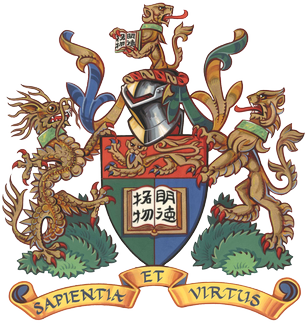
The University of Hong Kong (HKU) is a public research university in Hong Kong. Founded in 1887 as the Hong Kong College of Medicine for Chinese, it is the oldest tertiary institution in Hong Kong. HKU was also the first university established by the British in East Asia.

Lu Yongxiang is a Chinese mechanical engineer and politician. He served as President of the Chinese Academy of Sciences and Vice Chairman of the National People's Congress.

Frank Hsia-San Shu, is a Chinese-American astrophysicist, astronomer and author. He is currently a University Professor Emeritus at the University of California, Berkeley and University of California, San Diego. He is best known for proposing the density wave theory to explain the structure of spiral galaxies, and for describing a model of star formation, where a giant dense molecular cloud collapses to form a star.
Zhejiang Medical University was a former university in Hangzhou, Zhejiang Province, China. In 1998, was merged into Zhejiang University to become its Medical School.
Xi-Cheng Zhang is a Chinese-born American physicist, currently serving as the Parker Givens Chair of Optics at the University of Rochester, and the director of the Institute of Optics. He is also the Chairman of the Board and President of Zomega Terahertz Corporation.
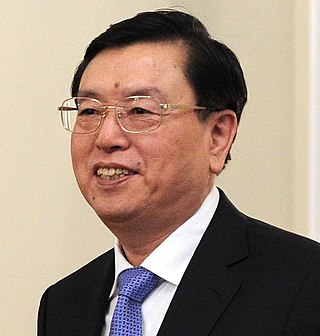
Zhang Dejiang is a Chinese retired politician. He served as the Chairman of the Standing Committee of the 12th National People's Congress, roughly the equivalent of a speaker of parliament in other countries between 2013 and 2018. He was also a member of the Politburo Standing Committee of the Chinese Communist Party (CCP), deputy head of the National Security Commission and the top official responsible for Hong Kong and Macau affairs.

Liao Chengzhi was a Chinese politician. He joined the Communist Party of China in 1928, and rose to the position of director of the Xinhua News Agency; after 1949, he worked in various positions related to foreign affairs, most prominently president of the Beijing Foreign Languages Institute, president of the Sino-Japanese Friendship Society, and Minister of the Office of Overseas Chinese Affairs.
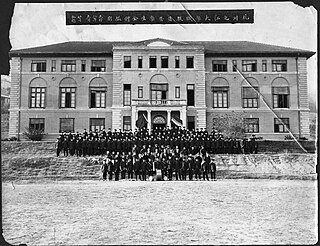
Hangchow University, also spelled as Zhijiang University and formerly known as Hangchow Christian College, Hangchow College and Hangchow Presbyterian College, is a defunct Protestant missionary university in China, which is one of the predecessors of Zhejiang University. Founded as Ningpo Boy’s Boarding School by Divie Bethune McCartee and colleagues of Northern Presbyterian Church in Ningbo in 1845, the university was one of the oldest missionary schools in China before it was shut down in 1952. The university was merged into Zhejiang University and other universities in China. Its campus was taken over by Zhejiang University as its Zhijiang Campus in 1961, which became a major nationally protected historic site in 2006.

Zhijiang Campus is an urban campus of Zhejiang University located in Hangzhou, Zhejiang, China. Located on riverside of the Qiantang River and close to the Liuhe Pagoda, it was the oldest university campus in Hangzhou. Built as the campus of Hangchow University, one of the oldest Christian colleges and universities in China, most of its buildings are protected as the Hangchow University Historic Site under the list of Major Sites Protected at the National Level. The campus is now home to James D. Watson Institute of Genome Sciences, Guanghua Law School and the Institute for Advanced Study in Humanities and Social Sciences.
The Anzhong Science and Technology Promotion Fund, is a fund of Zhejiang University mainly for promoting scientific research and technological innovation.

Liu Chen is an American theoretical physicist who has made original contributions to many aspects of plasma physics. He is known for the discoveries of kinetic Alfven waves, toroidal Alfven eigenmodes, and energetic particle modes; the theories of geomagnetic pulsations, Alfven wave heating, and fishbone oscillations, and the first formulation of nonlinear gyrokinetic equations. Chen retired from University of California, Irvine (UCI) in 2012, assuming the title Professor Emeritus of physics and astronomy.
The Shouters, or more properly the Shouters sect (呼喊派), is a label attached by the People's Republic of China (PRC) to an amorphous group within China that was targeted by the government first as counterrevolutionaries and subsequently as a criminal cult after incidents in Dongyang and Yiwu counties in Zhejiang province in February 1982. "The Shouters sect" became the object of waves of arrests in 1983 and again in 1995. Several 1983 publications with ties to the Three-Self Patriotic Movement (TSPM) accused the late expatriate Chinese Christian teacher Witness Lee of being the leader of "the Shouters sect" and of instigating the disorders. In practice, however, the appellation "the Shouters sect" has been applied far more broadly to many groups that pray openly and audibly and/or do not register or otherwise cooperate with the TSPM. There is considerable reason to doubt the veracity of the reports which led to the condemnation of "the Shouters sect" and the association of them with Witness Lee or the local churches, and the local churches distance themselves from the Shouters.
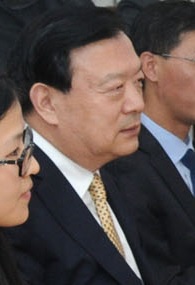
Xia Baolong is a Chinese politician. Originally from Tianjin, Xia began his political career in the Communist Youth League. He served as the vice mayor of Tianjin, governor and Communist Party Secretary of Zhejiang province. Since 2018, he has served as a vice chairman of the 13th Chinese People's Political Consultative Conference (CPPCC) and secretary general. He has a doctoral degree in Economics. Xia was appointed director of the Hong Kong and Macau Affairs Office in February 2020.

The Qiantang River, formerly known as the Hangchow River and alternatively romanised as the Tsientang River, is a river in East China. An important commercial artery, it runs for 459 kilometers (285 mi) through Zhejiang, passing through the provincial capital Hangzhou before flowing into the East China Sea via Hangzhou Bay south of Shanghai. Its original name, the "Zhe River" or "Zhe Jiang", is the origin of the name of Zhejiang province. The river is also known, along with Hangzhou Bay, for having the world's largest tidal bore, a phenomenon where leading edge of the incoming tide forms a wave of water that travels up a river or narrow bay against the direction of the river or bay's current.
Guan Yi is a Chinese virologist. In 2014, he was ranked as 11th in the world by Thomson Reuters among global researchers in the field of microbiology. He obtained his PhD in microbiology at the University of Hong Kong and is now a professor of microbiology at his alma mater. His research on the viral respiratory disease SARS helped the Chinese government avert the 2004 outbreak of this disease. He is the current director of the State Key Laboratory for Emerging Infectious Diseases University of Hong Kong. In early 2017, Guan warned that the H7N9 influenza virus "poses the greatest threat to humanity than any other in the past 100 years".
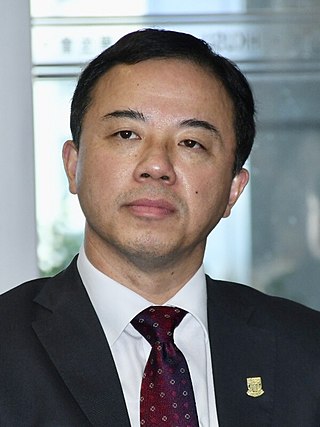
ZhangXiang is a Chinese-American academic administrator, material scientist, optical engineer and physicist. He is the current Vice-Chancellor and President of the University of Hong Kong (HKU), where he also serves as professor. He was the inaugural Ernest S. Kuh Endowed Chaired Professor at University of California, Berkeley in the United States, the Director of the National Science Foundation Nano-scale Science and Engineering Center (SINAM), the Director of Materials Science Division and also a Senior Faculty Scientist at Lawrence Berkeley National Laboratory.
Zhang Junsheng was a Chinese optical engineer, politician, and academic administrator. He spent 25 years as an engineering professor at Zhejiang University and won two national science and technology awards, before entering politics and being sent to Hong Kong in 1985 to prepare for the British colony's return to China. During his tenure as Beijing's chief spokesman in Hong Kong, he fiercely clashed with Chris Patten, the last British governor in Hong Kong, over the latter's effort to implement political reforms over Beijing's objection. Their public dispute dominated news headlines in Hong Kong. After the transfer of sovereignty over Hong Kong on 1 July 1997, Zhang returned to Zhejiang University to serve as its Party Secretary. He oversaw the school's merger with three other universities and used his Hong Kong connections to raise funds for the university.

Gao Fu, also known as George Fu Gao, is a Chinese virologist and immunologist. He has served as Director of the Chinese Center for Disease Control and Prevention from August 2017 to July 2022 and Dean of the Savaid Medical School of the University of Chinese Academy of Sciences since 2015.
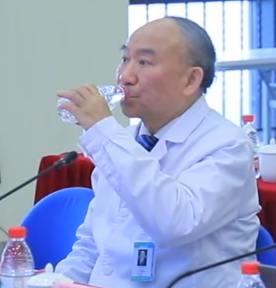
Zheng Shusen is a Chinese engineer and surgeon. He is a liver transplant expert who is a professor and doctoral supervisor at Zhejiang University. He is an academician of the Chinese Academy of Engineering and foreign academician of the Académie Nationale de Médecine. He is internationally known for his studies on organ transplantation and hepato-pancreato-biliary surgery.
Tai-Kai Ng is a physicist from Hong Kong.
References
- ↑ "Fuchun Zhang Personal Page". Zhejiang University. Retrieved 7 May 2022.
- ↑ "Prof. Fuchun Zhang". University of Hong Kong. Retrieved 7 May 2022.
- ↑ "APS fellow archive". American Physical Society. Retrieved 7 May 2022.